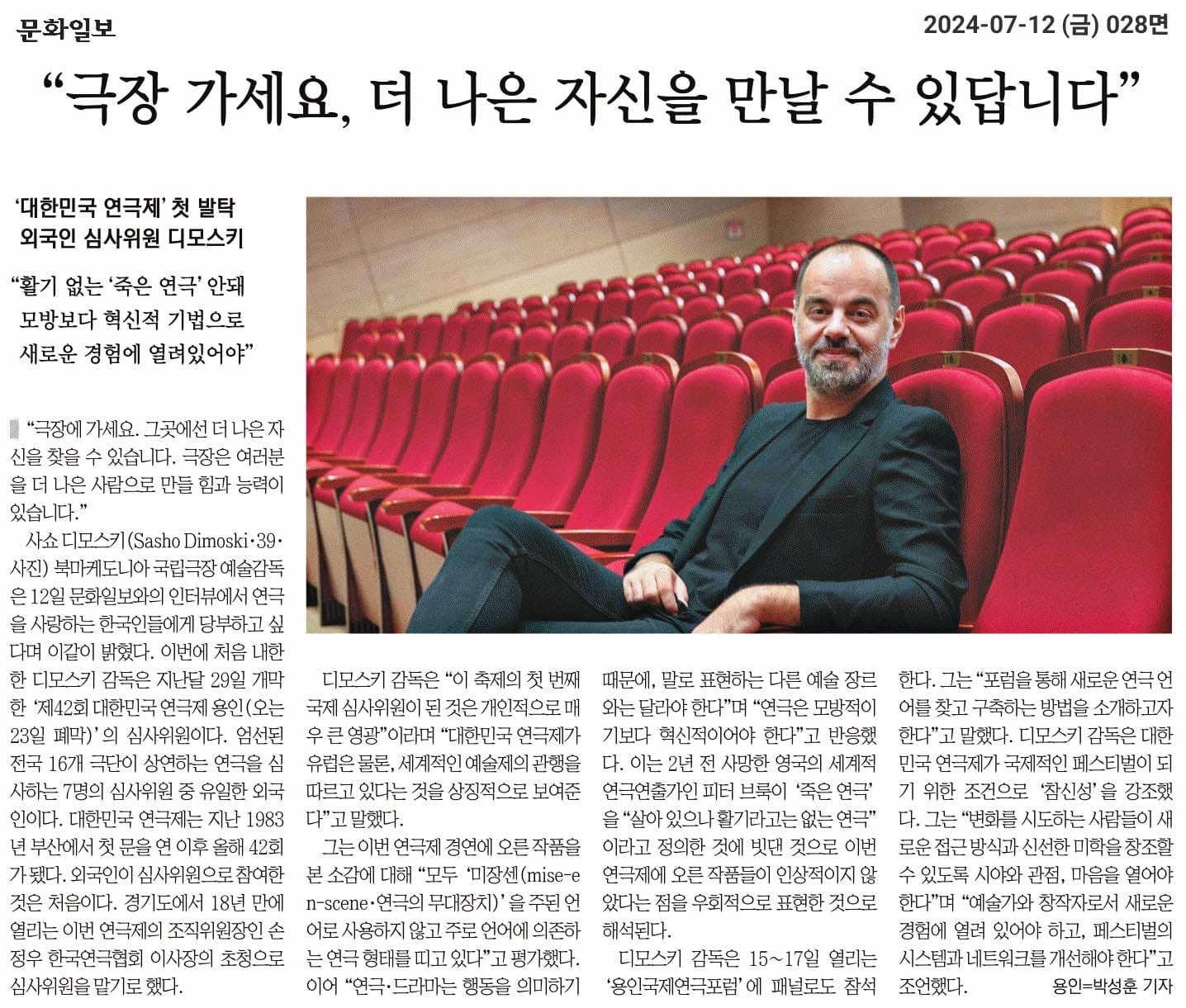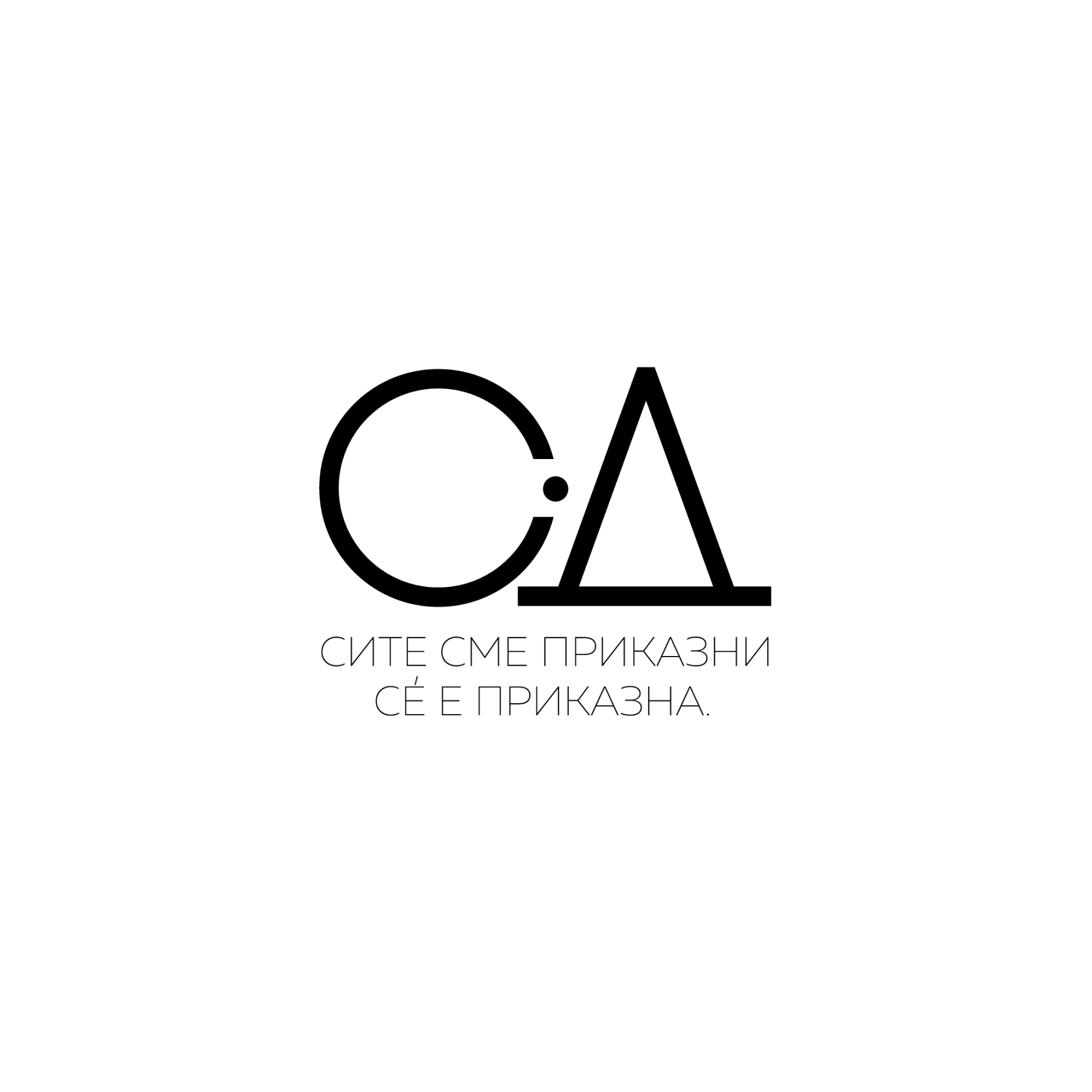
Интервју Кореја
- Brief self-introduction
Sasho Dimoski, (1985) PhD in performing arts, is Macedonian writer, drama-artist and university professor. His portfolio, realized in the fields of literature, theatre and ballet, contains over 40 original titles, awarded with national and international awards. Beside the Macedonian works, he has worked with theatres and publishers from Serbia, Croatia, Montenegro, Hungary, Bulgaria, Albania, Australia, USA, Poland etc. At the moment he is at the position general manager of National theatre in Veles, R. N. Macedonia, selector of the international festival of antique drama “Stobi” and teaches “History and
theory of world drama and theatre” at the international university “Europa Prima” in Skopje, R. N. Macedonia. His professional expertise is in the field of post-dramatic theatre forms.
- My impressions of Korea while living in Korea for about 10 days
My biggest impression, beside the urban living, are the people of Korea – their kindness, friendly approach, as well as the big respect they have shown me. I’m still getting used to the food, which I find very exotic, having on mind my native cuisine and the European feeding concept generally. I can’t hardly wait to explore more of it in each and every sense!
- Introduction to North Macedonia
North Macedonia is located in the heart of the Balkan peninsula, Southeastern Europe, bordering with Greece, Serbia, Albania and Bulgaria. The country has very rich history – dating from the Antique period, to the Byzantine, to the ottoman rule and up to nowadays. Until 1990, Republic of Macedonia was part of the Yugoslavian federation, and after the federation broke, Macedonia it is an independent state. In 2019, due to the country’s approach to NATO alliance, the official name has been changed from Republic of Macedonia to Republic of North Macedonia by the contract of Prespa, which was a condition demanded by Greece due to historical issues. The country is characterized with ethnical variety, rich and unique tradition and warm-hearted people.
- My impressions of watching the Korea Theatre festival competition
from the opening ceremony to the performance I currently watched. From the opening ceremony so far, I have watched seven performances and the thing that they all have in common is the dominantly verbal theatre form in which the mise-en-scene is not being used as dominant language of the performances, which should be main characteristic of theatre, because theatre/drama means action, not talking – other artistic genres are for such an expression. In this sense, I would use Peter Brook’s definition of deadly theatre to sum my impression so far.
- What level of Korean theatre artists do you think they are?
The Korean actors depend on what their theatre directors and dramaturgs have as concept for the performance, the designers (stage, costume, light) as well. So, in this sense, my opinion is that the theatre directors, along with their dramaturgs, have to work on building contemporary theatre language that communicates with the audience nowadays and to develop the theatre aesthetics into fresh, new and current theatric expressions in sense of creating universal theatre discourse.
- What kind of theatre festivals are in Macedonia and what is the Korea Theatre festival compared to? What kind of status do you think it can have?
Macedonia has various theatre festivals. The oldest and the most important is the Macedonian National Festival which is held for 58 years at the city of Prilep, on which, due to the selector’s choice, the National theatres from Macedonia compete. Also, there is the famous Youth Open Theatre (MOT), which is international festival of experimental theatre, held in Skopje for 48 years. One of the biggest and most important festivals in Macedonia (not only for theatre, but for music also) is Ohrid Summer Festival, held in the magical city of Ohrid for 64 years now. The International Festival of Antique drama STOBI, which is under my selection for the past 4 years, had it’s beginnings in 1991, and officially is held for 23 editions. The National theatre in Bitola is the home of Bitola International Shakespeare festival, held for 10 years now. There is the festival of chamber theatre “Risto Shishkov” held in the city of Strumica, founded in 1992. Also, there are few more, not so big or important festivals.
- What would you like to say at the International Forum Program held during the Korea Theatre Festival? Do you have any suggestions?
At the International theatre Forum program I will represent the portfolio of the National theatre JHK Djinot in Veles, as well as the International festival of Antique drama “Stobi” as an unique platform for international theatre exchange. My purpose is to expose the new aesthetics bult on the repertoire of the theatre and the ways of finding/building new theatric languages, having on mind the experimental and laboratory approach to the contemporary theatre as dominant on the theatre’s repertoire. On the other hand, I would emphasize the urgent need of international linking between theatres and theatre artistis in global sense by offering some mechanisms for such collaborations.
- What efforts must be made for the Korean Theatre Festival to become global festival? Is it visible?
For every change to be done, the changers need to open their perspective, their optics, their minds to new approaches and creating new, fresh aesthetics. That means – to be opened to new experiences as artists, as creators, and to build own system/network for international presentation and placement of the festival. Linking the “global village” which we live at, can be a suitable tool for such a change, moving towards internationalization.
- Is there anything you would like to say to Korean theatregoers?
Go to theatre. You can find better version of yourself there. Theatre can make you a better person, it has the power and ability to do so.



